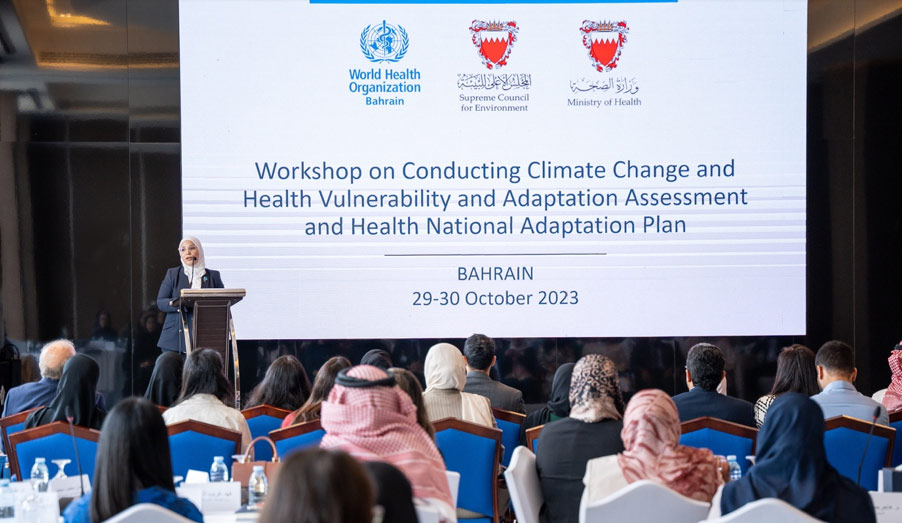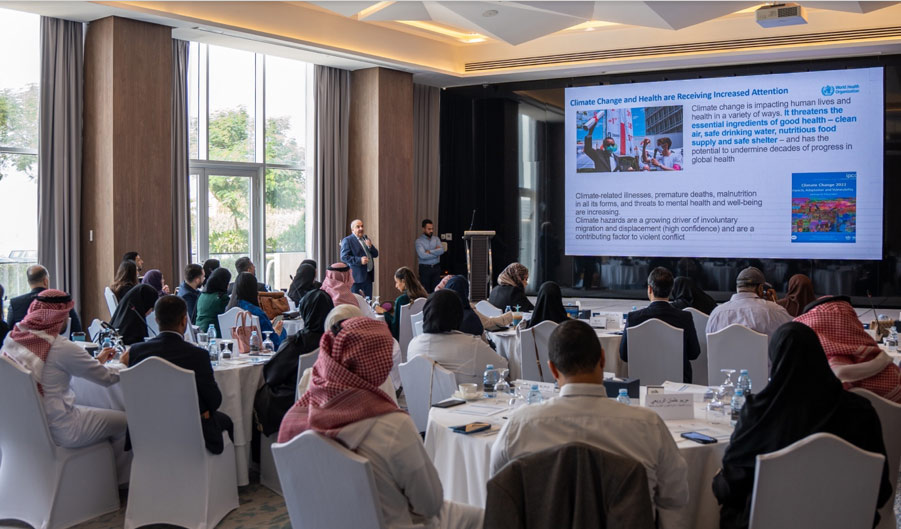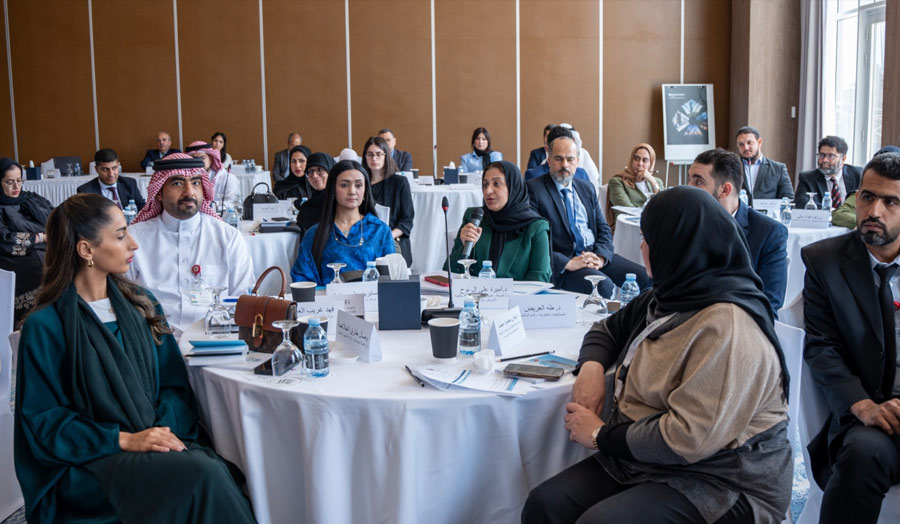 Participants of the Workshop on Conducting Climate Change and Health Vulnerability and Adaptation Assessment and the Health National Adaptation Plan. Photo credit: WHO/WHO Bahrain
Participants of the Workshop on Conducting Climate Change and Health Vulnerability and Adaptation Assessment and the Health National Adaptation Plan. Photo credit: WHO/WHO Bahrain
Under the direction of the Supreme Council for Environment and the Ministry of Health, the WHO Country Office in Bahrain organized the Workshop on Conducting Climate Change and Health Vulnerability and Adaptation Assessment and the Health National Adaptation Plan on 29–30 October 2023.
The main aim of the workshop was to foster an outcome-oriented dialogue around the direct and indirect health impacts of climate change and the urgent need to build climate-resilient and environmentally sustainable health systems that can anticipate, respond to, cope with, recover from and adapt to climate-related shocks. It also introduced WHO tools and guidelines that can support countries to achieve their commitments to build climate-resilient health systems.
The workshop was inaugurated by Dr Tasnim Atatrah, WHO Representative, Bahrain; Ms Layla Sabeel, Director of Climate Change and Sustainable Development, Supreme Council for Environment; and Dr Mohamed Abdulmajeed Alawadhi, Public Health Director, Public Health Directorate, Ministry of Health.
 Dr Tasnim Atatrah, WHO Representative, Bahrain, delivers her opening remarks to workshop participants. Photo credit: WHO/WHO Bahrain
Dr Tasnim Atatrah, WHO Representative, Bahrain, delivers her opening remarks to workshop participants. Photo credit: WHO/WHO Bahrain
“Climate change is, without a doubt, one of the defining issues of our time. It is also one of the world’s most urgent health threats,” said Dr Atatrah. “The World Health Organization remains committed to supporting the Kingdom of Bahrain in addressing the health impacts of climate change and building climate-resilient and environmentally sustainable health systems towards achieving our goals of promoting health, keeping the world safe and protecting the vulnerable.”
The workshop brought together more than 50 participants from various sectors, including the Supreme Council for Environment, Ministry of Health, Ministry of Sustainable Development, Ministry of Transportation and Telecommunications, Ministry of Works, Ministry of Labour, Ministry of Municipalities Affairs and Agriculture, National Health Regulatory Authority and primary health care centres. Experts from the WHO Regional Office for the Eastern Mediterranean facilitated the event.
Climate change and human health have an intricate relationship. The workshop explored how climate change jeopardizes the realization of universal health coverage by compounding the burden of disease, increasing the risk of infectious disease outbreaks and emergencies, and worsening existing barriers to accessing health services. It also highlighted how important it is to promote intersectoral collaboration to reduce climate-related health risks and safeguard public health from climate change impacts.
 Mr Mazen Malkawi, Regional Advisor, Environmental Health, WHO Regional Office for the Eastern Mediterranean, gives an overview of climate change impacts on health and well-being. Photo credit: WHO/WHO Bahrain
Mr Mazen Malkawi, Regional Advisor, Environmental Health, WHO Regional Office for the Eastern Mediterranean, gives an overview of climate change impacts on health and well-being. Photo credit: WHO/WHO Bahrain
A defining aspect of the workshop was its focus on increasing knowledge and understanding of the process of developing a health national adaptation plan (HNAP). This should be informed by a comprehensive climate change and health vulnerability and adaptation assessment (V&A).
An HNAP is the health component of a country’s national adaptation plan. Its use is among the commitments made by countries at the 2021 United Nations Climate Change Conference (COP26) towards building climate-resilient health and environmentally sustainable health systems.
The first step in developing an HNAP is to conduct a climate change and health V&A. This will provide the foundational information to devise actions to address the health impacts of climate variability and change at any level. Guided by the V&A, the HNAP then sets out a range of actions to address the health impacts of climate change and build climate-resilient health systems.
 Dr Ameera Ali AlNooh, Public Health Consultant and Head of the Noncommunicable Diseases (NCDs) Control Group in Bahrain’s Public Health Department, takes part in the group work discussion. Photo credit: WHO/WHO Bahrain
Dr Ameera Ali AlNooh, Public Health Consultant and Head of the Noncommunicable Diseases (NCDs) Control Group in Bahrain’s Public Health Department, takes part in the group work discussion. Photo credit: WHO/WHO Bahrain
Invaluable insights from the group work discussions informed the workshop outcomes. The discussions revolved around the need for further capacity-building and awareness-raising on the impacts of climate change on health and well-being. Moreover, the participants worked with one another to identify opportunities and good practices for developing the HNAP for Bahrain, guided by a V&A.
This workshop served as a practical starting point to initiate a V&A and the development of the HNAP for the country, building on Bahrain’s National Adaptation Investment Plan. In keeping with the country’s national priorities, this step marks yet another milestone in ensuring that health is at the centre of national action on climate change.


